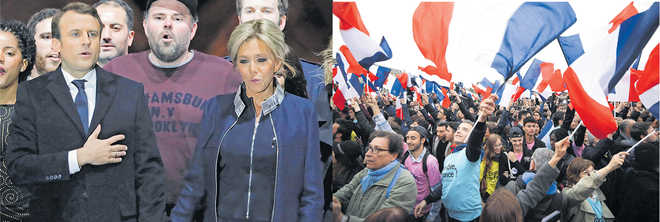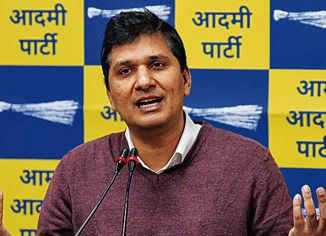
Man of the moment: French President-elect Emmanuel Macron & his wife Brigitte Trogneux celebrate at his victory rally near the Louvre in Paris, France. (R) Macron’s supporters wave the French national flags. Political pundits were proved wrong. Reuters/AFP
Shelley Walia
THE French have handed a resounding defeat to Marine Le Pen. The election of Emmanuel Macron and his En Marche! party, suggests a new wave of hope and optimism. It is anticipated that Macron will stem the rising tide of regressive right-wing politics and usher in a more enlightened economically responsible Socialist government with a globalist viewpoint that is more sensitive to the needs of the people.
Incidents of terrorism and mass refugee influx were all valid concerns, but were abused and misappropriated by a leadership that preached a nationalist agenda based on anti- globalisation, sealing of the borders, and dismantling the EU. None of this was realistically feasible and the vision of reverting Europe back to its roots, each country cocooned in its shell, was neither possible nor economically viable. But populism, fed by the deep-seated anger of the "natives" was fertile ground for Marine Le Pen to sow her polarising politics of hate and distrust. For all the forward-thinking citizens of a globalised Europe, the vision of Le Pen winning the election was terribly disconcerting, conjuring up an image of a dark scenario of the clash of civilisations.
The battle for the presidency on Sunday could have gone either way, though the prediction that a leader like Emmanuel Macron who is ideologically opposed to fascism will win has indeed been proven right. Socialist France has elected a businessman. Better a man from the business world than a fascist. Judging by the defeat of Le Pen's father Jean-Marie to Jacques Chirac in the 2002 elections, when various parties and millions on the streets joined hands to ward off the fascist, it is valid to hold the view that the liberal masses in France refused to buckle under the discourse of nativism or fear then as much as now.
This sanguinity in the last few days was reinforced with François Fillon, the centre-right Republican, and Benoît Hamon, the centre-left Socialist as well as François Hollande pitching their support for Macron. The death of the traditional political parties, the Socialists and the Republicans, a historic landmark in French politics, gave way to the rise of a fringe party like the Front National and the middle-ground movement, En Marche (On the Move) led by the 39-year-old Macron. Appearing before his supporters, Macron emphasised, "I want to be the President of all the patriots against the threat of all the nationalists." In an era of rapid change, Macron, the man for the moment who set up a fledgling party just a year ago, has proved many political pundits wrong.
The conflict on the whole in the closely fought elections lay broadly on two issues: Supporting globalisation and confronting terrorism. It was always a choice between the far-right bloc consisting of nationalists who believed they had been given a kickstart by the Brexit vote that showed signs of opposition to the bureaucratic arrogance in Brussels, and the middle-ground centrists who leaned more towards an anti-Trumpian ideology of pluralism. Similar to the manifestoes of Donald Trump, Theresa May or Narendra Modi, the highlight of Le Pen's posture was the support for the common people against the rarified elites from the left. The pro-EU leadership, though hopeful of the victory of Macron, had a certain haunting fear arising from the electoral shock of the Brexit and Trump victories. This was indeed, ill-founded. The man for the moment has won.
The threat of right-wing populism in Europe though stemmed now, will linger substantially in the years to come unless concrete steps are taken for reducing unemployment, countering migration and the threat from the Middle East and North Africa. It, therefore, becomes essential to restrict the tide of widespread resentment against the EU institutions in the coming months under the leadership of Macron though he will face the challenge of exercising a free hand in a Parliament where to win the 289 seats needed for a majority is a far-fetched possibility considering the political infancy of most of his party members.
The task before Macron is daunting; he will be forced to amend corporate and payroll taxes, increase the military budget, and most importantly, take concrete steps to counter religious discrimination. He will have to streamline labour laws, invest in education and vocational training, and reinvent vigorously the relationship of France with Europe. With his background as a technocrat and a banker who has the rare distinction of being an assistant to the phenomenologist Paul Ricœur, Macron was the only candidate who could meet the populist wave spreading across Europe head-on.
A stable world where the balance of power among America, Europe, and Russia is retained, democratically inclined people across the world have kept their fingers crossed and waited for a result that would at least postpone the danger of rampant nationalism of the early 20th century. En Marche's credo of hope and change has finally won the day and France is no longer "confined to fear" that Le Pen had tried to inject into the populace. "The world changes," Macron asserted, announcing the beginning of a new world order, in which "one must be right or left." His call to his countrymen "to fight the Front National and doom its catastrophic projects" indeed has helped in thwarting Le Pen's fascist agenda for the time being.
The leaders of Europe will have to balance the needs of their countrymen with those of the international realities of a global marketplace, to honour and acknowledge the rights and liberties and economic opportunities of their citizens as well as validate and accept those of the new entrants to their shores. Macron is ideally suited to address this enormous structural challenge and the people of France have reposed their confidence and trust in him. This is a victory for Macron's philosophy of a globalist worldview against Le Pen's ultra nationalism though she may remain a formidable force in French politics for years to come. However, for now and hopefully for the foreseeable future the pall of paralysing, retrograde fear has lifted, and Democracy continues its onward march.
The writer is Professor Emeritus and Fellow at Panjab University, Chandigarh



























